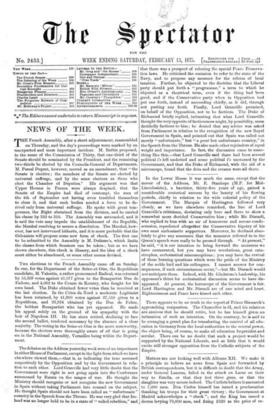The debates on the Address yesterday week were of no
importance in either House of Parliament, except in the light from which we have -elsewhere viewed them,—that is, as indicating the tone assumed -respectively by the Opposition and by the Government in rela- tion to each other. Lord Granville 14ad very little doubt that the Government were right in not going again into the Conference summoned by Russia on the usages of war. He thought the • Ministry should recognise or not recognise the new Government in Spain without taking Parliament into counsel on the subject. Ile thought Spain should not have been called an " unfortunate " country in the Speech from the Throne. He was very glad that Ire- land was no longer held to be in a state of "veiled rebellion," and that there was a prospect of relaxing the special Peace Preserva- tion laws. He criticised the omission to refer to the state of the Navy, and to propose any measure for the reform of local taxation. Further, he objected to the doctrine that the Liberal party should put forth a "programme," a term to which he objected as a theatrical term, even if the thing had been good, and if the Conservative party when in Opposition had put one forth, instead of succeeding chiefly, as it did, through not putting any forth. Finally, Lord Granville promised, on behalf of the Opposition, not to be factious. The Duke of Richmond briefly replied, intimating that what Lord Granville thought the very opposite of factiousness might, by possibility, seem decidedly factious to him ; he denied that any advice was asked from Parliament in relation to the recognition of the new Royal Government in Spain, and pointed out that Spain was called not merely "unfortunate," but "a great but unfortunate country," in the Speech from the Throne. He also made other rejoinders of equal weight and importance. In fact, the discussion came to some- thing like this,—that Lord Granville said there had been several political i's left undotted and some political t's uncrossed by the Government, and that the Duke of Richmond, with the aid of a microscope, found that the dots and the crosses were all there.


































